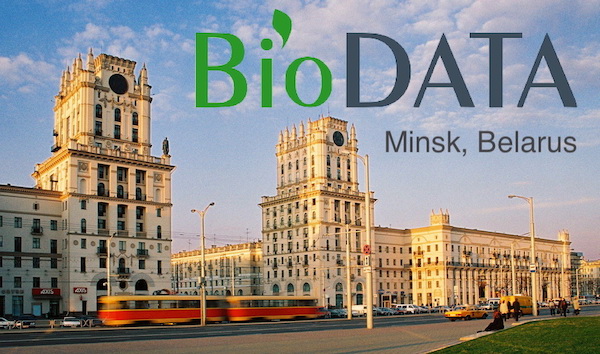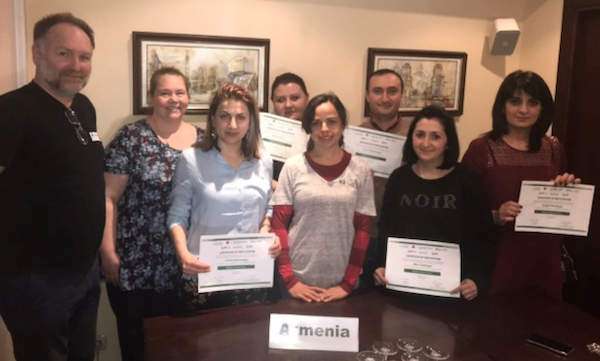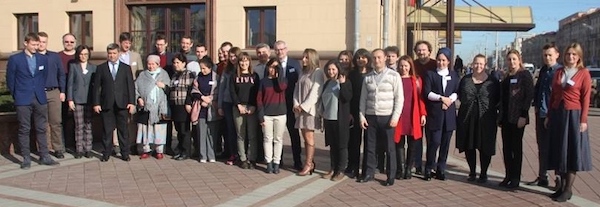The trainers assist the project by completing one or more of the following tasks:
- Carrying out training events and activities (e.g. objectives, structure, agendas, group dynamics), following current best practices on instructional design.
- Developing and adapting training resources (including translation), such as presentations for online and live events, theoretical explanatory materials, exercises, use case documents, infographics, and other multimedia resources.
- Directly supporting the students in their learning process through online and face-to-face interactions.
- Designing and implementing fair and transparent capacity assessment mechanisms supporting capacity certification within the programme.
Successful attendees will be issued a certificate of attendance corresponding to 2 ECTS and a digital GBIF Certified Trainer badge. This training model has been tested in the Biodiversity Information for Development (BID) programme and is adapted to BioDATA needs. The badge certifies that the wearer has collaborated as a trainer in capacity enhancement activities related to data skills in higher education. This specific training is the most advanced among the project activities and is targeted at the community of emerging professionals in the field of biodiversity informatics and other biodiversity sciences. The course is designed for 8-16 participants. Upon completion of this course, certified mentors will be involved in the following activities of the BioDATA project in their countries.
For this train-the-mentors course we are looking for people with some experience with tabular data management and databases; a deep interest in biodiversity data and open data; good language skills in English, better than basic understanding, and the ability to follow high-speed presentations; a passion for teaching and learning; a connection to the host institution until end of the project and the ability to travel for all planned events (until March 2021). All applicants must submit a motivation letter as part of their registration that outlines their suitability according to the recruitment criteria above.
Eligibility is limited to the partner countries in the BioDATA project: Belarus, Ukraine, Armenia, and Tajikistan. Travel, transport, food, and accommodation will be covered for accepted participants in this course. Travel and accommodation will be arranged by the course and no expenses can be claimed from the project. Please note that all participants must have valid travel insurance that covers medical expenses.
Program overview
A detailed overview of the BioDATA train-the-mentors course is provided by the agenda (PDF) and the program (PDF) documents.
Preparatory pre-course activities (5-15 February)
Preparatory pre-course activities and assignments. See the program document for further details. All participants will get login instructions for the e-learning platform we will use during the BioDATA courses. You will also find a copy of all the preparatory materials here.
Onsite course (18-22 February)
Sunday 17 February: Travel day for most mentor-trainees. Project coordination meeting for project partners and trainers (who are advised to arrive on Saturday 16 February).
Monday 18 February: Train-the-mentors training course starts. Introduction, terminology, data standards, and planning for data publication workflows. (Materials Day 1, Use Case 1)
Tuesday 19 February: Data capture, digitization, and data cleaning tools and concepts. (Materials Day 2).
Wednesday 20 February: Data cleaning with Open Refine, data descriptor publications, dataset metadata. Data publication with the GBIF IPT (integrated data publishing toolkit). Materials Day 3.
Thursday 21 February: Data papers and FAIR open data guidelines. How to teach the course? Mentor group-work assignments, presentations and discussions. Materials Day 4.
Friday 22 February: Prepare for the train-the-students events in each partner home country. The closing of the training event in the late afternoon. Materials Day 5.
Saturday 23 February. No course program. Travel day back home for most participants.
Follow-up activities (4-15 March)
More details about the follow-up activities and assignments will be provided after the onsite course.
Venue in Minsk
The venue for the training and the accommodation will be at the Minsk Hotel at Nezavisimosti ave. 11, Minsk, Belarus, 220030. We have organized transport for all participants from the airport to the hotel upon arrival and from the hotel to the airport upon departure (see travel information below).
Teachers and mentors
Teachers: Dag Endresen (GBIF Norway), Laura Russell (GBIF Secretariat), and Dmitry Schigel (GBIF Secretariat).
Mentors: Rukaya Johaadien (GBIF Norway), Piotr Tykarski (GBIF Poland), Maxim Shashkov (GBIF.ru team), and Natalya Ivanova (GBIF.ru team), with assistance from Anton Savchenko and Oleh Prylutskyi who are BioDATA project partners from Ukraine.
Status for registration
Registered mentor-trainees and project partners: Armenia 4+2, Belarus 5+3, Tajikistan 4+2, Ukraine 4+1. Mentor-trainees for this event will contribute as mentors for teaching in the later training events in each country. In addition, 3 trainers (from GBIF Secretariat and GBIF Norway) and 4 mentors (from GBIF Norway, GBIF Poland, and the GBIF.ru team), and all project partners have registered to attend this BioDATA event in Minsk. In total 35 participants.
GBIF awards badges based on post-course assignments. From the train-the-mentors course in Minsk 5 participants earned the BASIC skills badge, and 11 participants earned the ADVANCED skills badge.
| Country | Not earned | Basic Badge | Advanced |
|---|---|---|---|
| Armenia (6) | 1 | 3 | 2 |
| Belarus (8) | 2 | 2 | 4 |
| Tajikistan (6) | 6 | - | - |
| Ukraine (5) | - | - | 5 |
| Sum (25) | 9 | 5 | 11 |
Travel information
Accommodations and flights were booked for all participants by the BioDATA secretariat at UiO Natural History Museum in Oslo. Travel, transport, accommodation, and meals were covered for all accepted participants in this course.
We have organized taxis to bring you from the airport to the hotel upon your arrival and also back to the airport on the day of your departure. Check the schedule here. The taxi company is called "Bronirovanie" and is located at Minsk National Airport. Upon your arrival, go to their transfer offices on the arrival floor near gates 3-4 or gate 5 where you will meet your driver (Note: the office near gates 3-4 is closed at night).
See Wikitravel for general travel information about Belarus. Citizens of many countries can visit Belarus without a visa when arriving and departing at Minsk National Airport. Official languages are Belarusian and Russian, English is not widely spoken in Belarus, and German is a more common second language. The currency is the Belarusian ruble (1 BYN approx. equals 0,4 Euro) available at ATMs, Visa, and Mastercard payment cards are widely accepted in larger supermarkets and large shops. Electricity is 220 V, 50 Hz with a European plug. The time zone is UTC+3 (Moscow Standard Time MSK).
Minsk Metro.


Funded by DIKU project CPEA-LT-2017/10049

